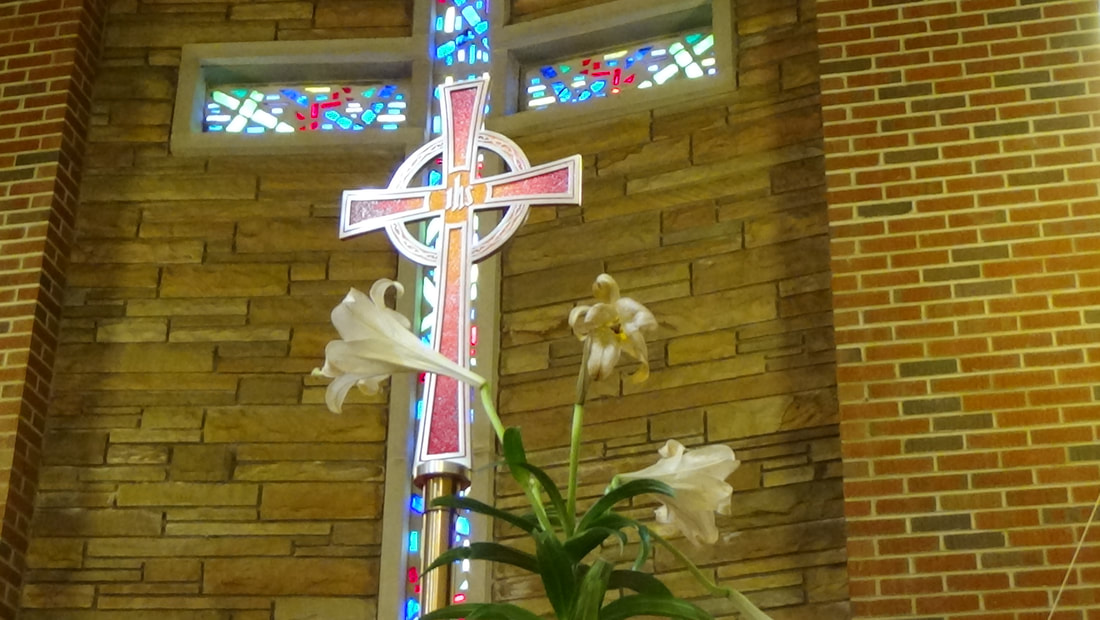|
Christ is risen! He is risen, indeed! Alleluia!
The Easter Lily has a history of being the traditional flower associated with our Lord’s resurrection. There are a variety of ideas on why this is so, from Christ’s mention of flowers in the fields (Matt. 6:25-33), to signifying the purity of Christ, to its growth from being buried in the earth as a bulb into something beautiful. Whatever the case of their inclusion in our yearly Easter celebration, they are a beautiful addition every year for both sight and smell. As we now enter into May, however, we will have seen those lilies start to droop and lose their brilliance. Their glory is fading. They are a reminder of the momentary nature of things of this world. Isaiah made the connection between fading flowers and our fallen human nature in Isaiah 40:7: “All flesh is grass, and all its beauty is like the flower of the field. The grass withers, the flower fades when the breath of the Lord blows on it; surely the people are grass.” The strength of our youth doesn’t last forever. Moreover, people are considering our mortality more than ever in recent years (something that previous generations had to consider much more as a daily reminder). Let alone the question of how we as sinners could ever stand vibrantly in the face of a pure, holy, and everlasting God. But Isaiah does not stop at verse 7. He continues in verse 8, “The grass withers, the flower fades, but the word of our God will stand forever.” There is one thing that will always remain. It is God’s Word. The transitory glory of this world and of our own bodies that have suffered the effects of sin does not apply to God’s Word. His Word is everlasting and eternal. No matter what we go through in this life, we have the Word that remains sure. And God’s Word is a word of mercy and compassion for sinners, the word of forgiveness. The invigorating word that brings us to new life. Peter quotes Isaiah 40:8 in 1 Peter 1:25. When you look at the context, it is all the more remarkable in what Peter is saying. In vv. 18-21, Peter writes, “[Y]ou were ransomed from the futile ways inherited from your forefathers, not with perishable things such as silver or gold, but with the precious blood of Christ, like that of a lamb without blemish or spot. He was foreknown before the foundation of the world but was made manifest in the last times for the sake of you who through him are believers in God, who raised him from the dead and gave him glory, so that your faith and hope are in God.” Peter is saying that Jesus’ glory lasts forever. Jesus’ resurrection is an everlasting resurrection. He will not die again. His body will not decay; he sees no corruption (Psalm 16:10; Acts 13:35). He has done this all for you. Then Peter says that the Word that remains forever is the Word that was preached to you (1 Peter 1:25). The good news—the eternal Word—has been preached to you! You have been Baptized into Jesus. You have been given the forgiveness of your sins because of His cross and Resurrection. Because if you are in Him, the promise of eternal life is for you too! Body and soul! Christ is risen! He is risen, indeed! Alleluia! Your Easter lilies won’t last forever. But I pray that this be a contrasting reminder of what does last forever: The Word of the Lord. It remains forever so that you—in Jesus—will too. Pastor |
Site powered by Weebly. Managed by HostGator









